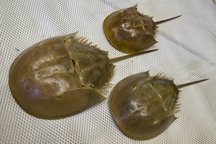These curious ancient animals have been roaming the waters of the Atlantic and Gulf of Mexico for over 450 million years. Though they appear dangerous they are quite harmless and are actually more closely related to spiders and scorpions than crabs. Horseshoe crabs are not as common in Pensacola as they are in Panama City and Port St. Joe areas, but once were once found here and occasionally still are. Many coastal states have been concerned by the decline in their numbers. In the Chesapeake area where they were once very common, horseshoe crabs are harvested for their copper-based blood and also as bait for eel fishermen. The copper-based blood contains lysate which has been used to detect bacterial contamination in many drugs, as well as use for the diagnosis for some diseases.
Though there is a fishery for them in Florida, the issue with most locals is just the loss of a really neat animal that has been around longer than the dinosaurs,. This time of year, near the full moon, horseshoe crabs begin to gather near nesting beaches to mate and lay eggs. The Florida Fish and Wildlife Conservation Commission is asking locals and tourists who find a horseshoe crab to report it. They are interested in sightings of both adults and juveniles (less than 4” in length), the date seen, the time, the location, and type of habitat if possible. To report you can visit their website (www.MyFWC.com), email at FWRI@horseshoe@fwc.state.fl.us , or call 1-866-252-9326
If you have any questions contact your county Sea Grant Agent for more information.
- Rattlesnakes on Our Barrier Islands; Part 5 – Reproduction - January 12, 2026
- Rattlesnakes on Our Barrier Islands; Part 4 – Thermoregulation - December 29, 2025
- Rattlesnakes on Our Barrier Islands; Part 3 – Envenomation - December 22, 2025

